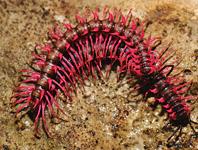Abstract
Turcolana Argano & Pesce, 1980 is the isopod genus occurring in freshwater and brackish groundwater environments around the eastern Mediterranean. In this study, a revised diagnosis of the genus, an updated map of species distribution and a key to species are presented. The first cave dwelling species is described from the Melissotrypa Cave in central Greece, a highly troglomorphic Turcolana lepturoides sp. nov. Its principal distinguishing characters are elongated appendages: styliform uropods (twice as long as pleotelson), antennae (half as long as body) and pereopods (e.g. pereopod 7 45% as long as body). Mitochondrial DNA sequences (16S rRNA, 12S rRNA) of the new species are provided.
References
Argano, R. & Pesce, G.L. (1980) A cirolanid from subterranean waters of Turkey (Crustacea, Isopoda, Flabellifera). Revue Suisse de Zoologie, 87 (2), 439–444.
http://dx.doi.org/10.5962/bhl.part.85525Baratti, M., Yacoubi Khebiza, M. & Messana, G. (2004) Microevolutionary processes in the stygobitic genus Typhlocirolana (Isopoda Flabellifera Cirolanidae) as inferred by partial 12S and 16S rDNAsequences. Journal of Zoological Systematics and Evolutionary Research, 42, 27–32.
http://dx.doi.org/10.1111/j.1439-0469.2004.00232.xBaratti, M., Filippelli, M., Nardi, F. & Messana, G. (2010) Molecular phylogenetic relationships among some stygobitic cirolanid species (Crustacea, Isopoda). Contributions to Zoology, 79 (2), 57–67.
Botosaneanu, L. & Notenboom, J. (1989) Eastern Mediterranean freshwater stygobiont Cirolanids (Isopoda, Cirolanidae). With description of three new species. Zoologische Jahrbücher Systematik, 116, 1–19.
Botosaneanu, L. & Notenboom, J. (1992) The stygobiont Cirolanidae (Isopoda) of Israel and Sinai. Israel Journal of Zoology, 37, 213–224.
Botosaneanu, L., Bruce, N.L. & Notenboom, J. (1986) Isopoda: Cirolanidae. In: Botosaneanu, L. (Ed.), Stygofauna mundi, a faunistic, distributional and ecological synthesis of the world fauna inhabiting subterranean waters, including the marine interstitial. E. J. Brill/W. Backhuys, Leiden, pp. 412–422.
Botosaneanu, L., Boutin, C. & Henry, J.P. (1985) Deux remarquables cirolanides stygobies nouveaux du Maroc et de Rhodes. Problematique des genre Typhlocirolana Racovitza 1905 et Turcolana Argano e Pesce 1980 (Isopoda). Stygologia, 1 (2), 186–207.
Coineau, N. (2000) Adaptations to interstitial groundwater life. In: Wilkens, H., Culver, D.C. & Humphreys, W.F. (Eds.), Subterranean ecosystems, Elsevier Press, Amsterdam, The Netherlands, pp. 189–210.
Coineau, N. & Boutin, C. (2015) Botolana, a new genus of groundwater cirolanid isopod (Crustacea) from Morocco. Bulletin de la Société Histoire Naturelle de Toulouse, 151, 29–34.
Dana, J.D. (1852) On the classification of the Crustacea Choristopoda or Tetradecapoda. American Journal of Science and Arts, Series 2, 14 (41), 297–316.
Factor, J.R. (1978) Morphology of the mouthparts of larval lobsters, Homarus americanus (Decapoda: Nephropida), with special emphasis on their setae. Biological Bulletin, 154, 383–408.
http://dx.doi.org/10.2307/1541067Keable, S.J. (2002) Taxonomic Revision of Natatolana (Crustacea: Isopoda: Cirolanidae). Records of the Australian Museum, 58, 133–244.
http://dx.doi.org/10.3853/j.0067-1975.58.2006.1469Kilias, A. & Mountrakis, D. (1987) Zum tektonischen Bau der Zentral-Pelagonischen Zone (Kamvounia-Gebirge, NGriechenland). Zeitschrift der Deutschen Geologischen Gesellschaft, 138, 211–237.
Poore, G.C.B. & Bruce, N.L. (2012) Global diversity of marine isopods (except Asellota and crustacean symbionts). PLoS ONE, 7, 1–15.
http://dx.doi.org/10.1371/annotation/3260cd00-89cf-4e08-ab25-07e0be598ab4Por, F.D. (1962) Typhlocirolana reichi n. sp., un nouvel isopode cirolanide de la Dépression de la Mer Morte. Crustaceana, 4 (4), 247–252.
http://dx.doi.org/10.1163/156854062X00229Prevorčnik, S., Blejec, A. & Sket, B. (2004) Racial differentiation in Asellus aquaticus (L.) (Crustacea: Isopoda: Asellidae). Archiv für Hydrobiologie, 160 (2), 193–214.
http://dx.doi.org/10.1127/0003-9136/2004/0160-0193Simon, C., Frati, F., Beckenbach, A., Crespi, B., Liu, H. & Flook, P. (1994) Evolution, weighting and phylogenetic utility of mitochondrial gene sequences and a compilation of conserved polymerase chain reaction primers. Annals of the Entomological Society of America, 87, 651–701.
http://dx.doi.org/10.1093/aesa/87.6.651Strouhal, H. (1960) Eine neue, ostmediterrane Typhlocirolana-Spezies (Isopoda, Cirolanidae). Annalen die Naturhistorisches Museums in Wien, 64, 178–184.
Trontelj, P. & Utevsky, S.Y. (2005) Celebrity with a neglected taxonomy: molecular systematics of the medicinal leech (genus Hirudo). Molecular Phylogenetics and Evolution, 34, 616–624.
http://dx.doi.org/10.1016/j.ympev.2004.10.012Vaxevanopoulos, M. (2006) Tectonic conditions in the speleogenetic process of Melissotripa cave in Kefalovriso of Elassona (Central Greece). Msc Thesis, Department of Geology, Aristotle University of Thessaloniki, Thessaloniki, 106 pp.
Wägele, J.W. (1989) Evolution und phylogenetisches System der Isopoda. Zoologica, 140, 1–262.

